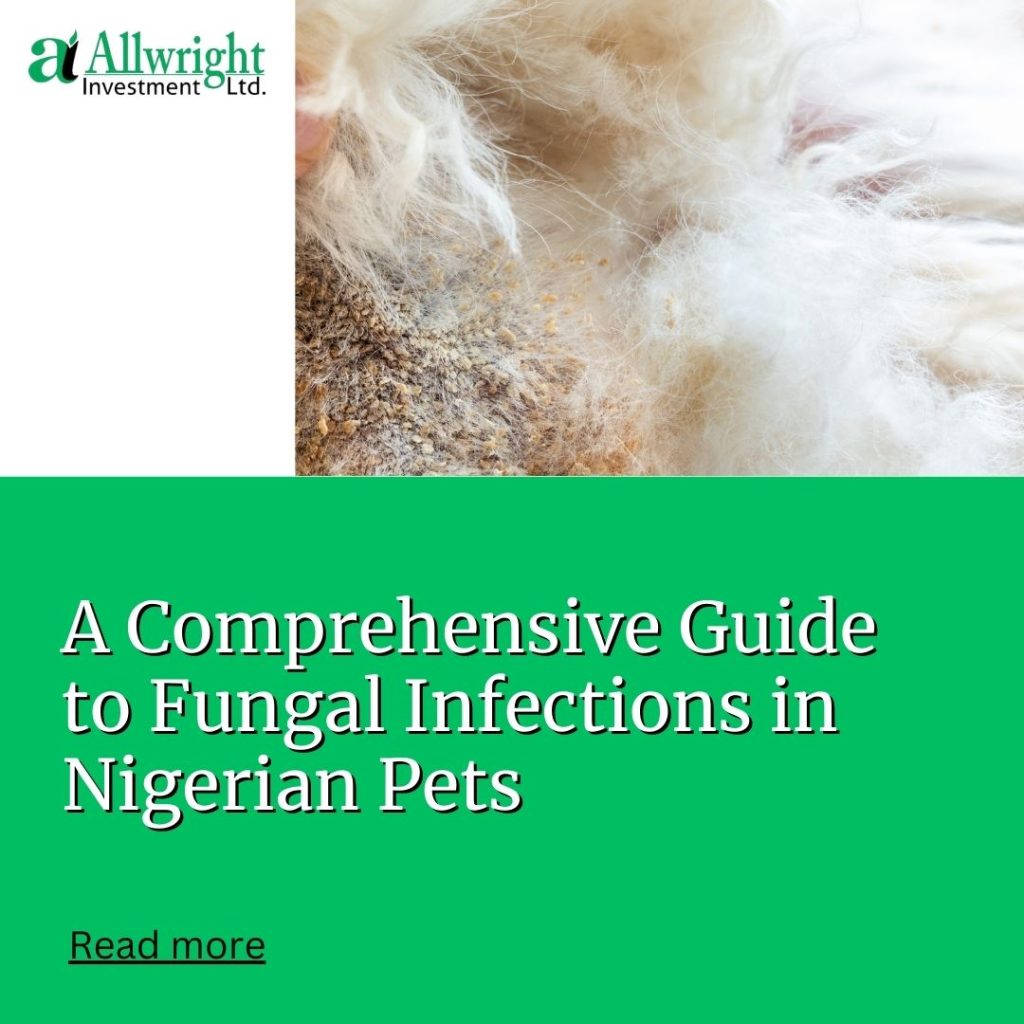
Fungal infections in pets are more common than many pet owners realize, especially in tropical climates like Nigeria’s. These infections can cause a wide range of health problems in pets, from mild skin irritations to more serious systemic issues. If not properly managed, fungal infections can significantly affect your pet’s health and quality of life.
Now, let’s look at the types of fungal infections that affect Nigerian pets, how to prevent them, and steps to ensure your furry friends stay healthy and happy.
Understanding Fungal Infections in Pets
Fungal infections in pets are caused by fungi that thrive in moist, warm environments. These organisms can invade your pet’s skin, nails, respiratory system, or internal organs, leading to a variety of symptoms. The most common types of fungal infections in Nigerian pets include:
- Ringworm: Despite its name, this is not a worm but a highly contagious fungal infection affecting the skin, hair, and nails. It manifests as circular, red patches of hair loss on your pet.
- Yeast infections: Caused by an overgrowth of yeast on the skin, leading to irritation, itching, and a distinctive odor.
- Aspergillosis: A more severe infection that can affect a pet’s respiratory system, often contracted through inhaling mold spores found in soil and decomposing matter.
- Blastomycosis: This is a serious systemic infection that affects pets living in areas with moist soil and decaying organic material.
Symptoms to Watch For
As a pet owner, being aware of the early signs of fungal infections can help prevent more serious complications. Common symptoms of fungal infections include:
- Persistent itching or scratching
- Red, inflamed skin
- Scaly or flaky patches of skin
- Bald spots, especially in circular patterns
- Unusual body odor
- Discharge from the eyes, ears, or nose
- Coughing or difficulty breathing (in severe cases)
If you notice any of these signs, consult a Allwright Investment Limited immediately. Early intervention can prevent the infection from spreading and causing further discomfort for your pet.
How Fungal Infections Affect Pet Owners
Fungal infections in pets can be a major source of stress for owners. Some of the pain points that pet owners in Nigeria commonly face include:
- Difficulty diagnosing the problem: Fungal infections often mimic other skin conditions like allergies or bacterial infections, making it hard for owners to identify the cause. This can lead to frustration as multiple treatments are tried without success.
- Cost of veterinary care: Treating fungal infections can require expensive antifungal medications, shampoos, or topical treatments, which can strain a pet owner’s budget.
- Risk of transmission: Some fungal infections, like ringworm, can spread from pets to humans, particularly children and elderly family members, creating a health concern for the whole household.
- Time-consuming treatment process: Managing a fungal infection often requires consistent treatment over several weeks or even months. This includes regular vet visits, administering medications, and ensuring your pet’s environment is kept clean and dry.
Preventing Fungal Infections in Pets
Prevention is always better than cure. Here are some practical steps Nigerian pet owners can take to prevent fungal infections:
- Maintain good hygiene: Regularly bathe your pets with antifungal shampoos, especially during the rainy season when fungal infections are more common.
- Keep your pet’s living area clean: Ensure that their sleeping area is dry and clean to reduce the risk of fungi thriving in their environment.
- Limit exposure to contaminated soil: Avoid letting your pets roam in areas with damp, decaying matter, such as gardens or farms.
- Inspect your pet regularly: Check your pet’s skin for any signs of infection, particularly if they have been in contact with other animals.
- Boost your pet’s immune system: A healthy diet rich in vitamins and minerals can strengthen your pet’s immune system, making them more resistant to infections.
Treating Fungal Infections in Pets
If your pet contracts a fungal infection, there are several treatment options available. The course of treatment will depend on the type and severity of the infection:
- Topical treatments: For skin infections like ringworm, antifungal creams or shampoos may be prescribed by your vet.
- Oral medications: More severe or systemic fungal infections may require oral antifungal medications. These can take several weeks to show results.
- Environmental decontamination: In cases where the infection could spread to other pets or humans, thorough cleaning and disinfection of your pet’s environment may be necessary.
Always follow your veterinarian’s advice on the best treatment plan for your pet, and avoid trying over-the-counter remedies without professional guidance.
Fungal infections in Nigerian pets can be challenging to deal with, but with early detection and proper management, they can be treated effectively. Pet owners need to be proactive in maintaining good hygiene and seeking veterinary care at the first sign of infection. By doing so, you can prevent your pet from suffering the discomfort of a fungal infection and protect the health of your household.
If you’re concerned about your pet’s health or need help with fungal infection treatment, reach out to Allwright Investment Limited, your trusted partner in veterinary services. We offer expert advice and the best products to keep your pet healthy and free from infections.
Invest in Allwright Investment Limited today!

Leave a comment
You must be logged in to post a comment.